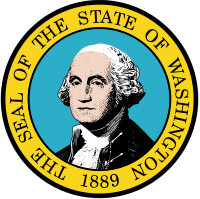Washington Initiative 920
| Elections in Washington |
|---|
 |
|
General elections
Gubernatorial elections
Attorney General elections Secretary of State elections State Senate elections State House elections State Supreme Court elections Other judicial elections |
|
|
| This article is part of a series on |
| Taxation in the United States of America |
|---|
 |
|
|
Initiative 920 (I-920) was a highly controversial campaign to repeal the estate tax in the U.S. state of Washington. Washington state law directs that revenues collected from the estate tax be placed into the Education Legacy Trust account, which funds financial aid for higher education. The initiative failed, with 33.54 percent voting for and 66.46 percent against.[1]
Supporters
The campaign to get I-920 on the ballot was primarily bankrolled by Martin Selig, a Seattle skyscraper developer, and Dennis Falk, a wealthy former Seattle police officer. Falk’s involvement has been particularly controversial. Falk leads the John Birch Society. In 1978, Falk co-chaired Save Our Moral Ethics, an unsuccessful campaign to repeal a law barring housing and employment discrimination against gays and lesbians. [2]
Supporters of I-920 claim the estate tax is an unfair burden on small business. They claim that if small businesses leave Washington, support for local schools will be eroded. They also contend that the 2005 legislature’s decision to renew the estate tax contradicted I-402, which was passed in 1981.[3]
Groups supporting I-920 include:
- Associated Builders and Contractors of Western Washington
- Association of Washington Business (AWB)
- Centralia-Chehalis Chamber of Commerce
- D.A. Burns & Sons
- Frank Gurney, Inc.
- GM Nameplate
- Greater Seattle Chamber of Commerce
Opponents
Criticism of I-920 has focused on two main points. First, critics argue that the estate tax is the most efficient way to raise revenue for education and that repealing the tax will compromise educational infrastructure, especially for the poor. Second, critics point out that the tax is graduated and therefore only impacts those most able to pay. They argue that the proponents of I-920 have used the rhetoric of small business interests to create tax breaks for the extremely wealthy. Family farms, for example, are completely exempt from the estate tax. Last year, the Washington Estate Tax affected only 250 of the wealthiest estates.[4]
Groups opposing I-920 include:
- American Federation of Teachers of Washington
- Children's Alliance
- First Place
- International Union of Operating Engineers — Local 609
- League of Education Voters
- League of Women Voters
- Lutheran Public Policy Office of Washington State
- Martin Luther King, Jr. County Labor Council, AFL-CIO
- Pierce County Human Services Coalition
- Public School Employees of Washington
- Retired Public Employees Council of Washington
- SEIU #925
- Statewide Poverty Action Network
- Tax Right
- Washington Association of Churches
- Washington Community Action Network
- Washington Education Association
- Washington State Labor Council
- Washington State NOW
- Washington State Parent Teacher Association
- Washington Tax Fairness Coalition
Results
| Yes | No |
|---|---|
| 207506 | 411149 |
| 33.54% | 66.46% |
External links
- Full text of I-920
- OFM report on potential financial impact of I-920
- Seattle Weekly on Selig and Falk
- Pro-I-920 page
- Anti-I-920 page
- NPI on I-920
- The Childrens Alliance onf I-920
- Information on various Initiatives from Washington Voter
- The Stranger on I-920 signature gathering
References
- ↑ King County Election Results
- ↑ Repeal of estate tax has wealthy backers
- ↑
- ↑ I-920 hurts higher education